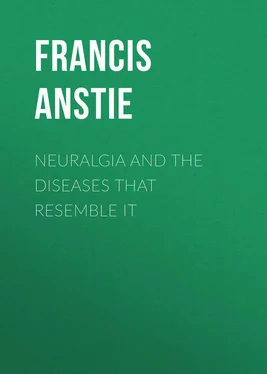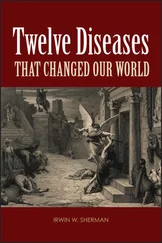Francis Anstie - Neuralgia and the Diseases that Resemble it
Здесь есть возможность читать онлайн «Francis Anstie - Neuralgia and the Diseases that Resemble it» — ознакомительный отрывок электронной книги совершенно бесплатно, а после прочтения отрывка купить полную версию. В некоторых случаях можно слушать аудио, скачать через торрент в формате fb2 и присутствует краткое содержание. Жанр: foreign_antique, foreign_prose, на английском языке. Описание произведения, (предисловие) а так же отзывы посетителей доступны на портале библиотеки ЛибКат.
- Название:Neuralgia and the Diseases that Resemble it
- Автор:
- Жанр:
- Год:неизвестен
- ISBN:нет данных
- Рейтинг книги:5 / 5. Голосов: 1
-
Избранное:Добавить в избранное
- Отзывы:
-
Ваша оценка:
- 100
- 1
- 2
- 3
- 4
- 5
Neuralgia and the Diseases that Resemble it: краткое содержание, описание и аннотация
Предлагаем к чтению аннотацию, описание, краткое содержание или предисловие (зависит от того, что написал сам автор книги «Neuralgia and the Diseases that Resemble it»). Если вы не нашли необходимую информацию о книге — напишите в комментариях, мы постараемся отыскать её.
Neuralgia and the Diseases that Resemble it — читать онлайн ознакомительный отрывок
Ниже представлен текст книги, разбитый по страницам. Система сохранения места последней прочитанной страницы, позволяет с удобством читать онлайн бесплатно книгу «Neuralgia and the Diseases that Resemble it», без необходимости каждый раз заново искать на чём Вы остановились. Поставьте закладку, и сможете в любой момент перейти на страницу, на которой закончили чтение.
Интервал:
Закладка:
Neuralgia of the rectum has been carefully described by Mr. Ashton, but is probably not often seen except by practitioners who possess special opportunities of observing rectal diseases. In the one pure case which has fallen under my notice the patient complained of acute paroxysmal cutting pains extending about one inch within the anus, and, as these were greatly increased by defecation I suspected the existence of fissure. Nothing of the kind, however, was found on examination; and the pain ultimately yielded to repeated subcutaneous injections of atropine. This patient had got wet through, and had sat in his damp clothes, getting thoroughly chilled; the pain came on with great suddenness and severity, and the tenderness which has been mentioned was developed very quickly. Probably the influence of cold and wet is among the commonest causes of the complaint. Mr. Ashton also reckons as causes, reflex irritation from other parts of the alimentary canal, and the influence of malaria. He observes that the subjects of the affection are most frequently anæmic, and of a generally excitable and deranged susceptibility, and that females, who, from menorrhagia, or frequent child-bearing with much hæmorrhage, have lost a great deal of blood, are specially predisposed.
Neuralgia of the testis (as an independent affection and not a mere extension of lumbo-abdominal neuralgia) is fortunately a much less common malady than the corresponding affection of the ovary; as might indeed be expected, from the much less degree of functional perturbation to which, in ordinary physiological circumstances, the former organ is exposed than the latter. Except from actual growths within the testis, of which it was a mere symptom, I have never seen neuralgia of the testis save from one of three causes. In one remarkable example it was produced as a reflex effect of severe herpes preputialis. Secondly, it is sometimes observed as a symptom of calculus descending the ureter. And, thirdly, I have seen it several times undoubtedly produced by excessive self abuse.
The occurrence of testicular neuralgia, in one case of epilepsy, as to the cause of which I had been previously much puzzled, led to the discovery of the real origin of the fits. I should observe here that I do not believe that self-abuse is ever more than an immediately exciting cause of epilepsy, a predisposition to the disease having previously existed in all cases. In the patient just referred to, there was a family history of epilepsy, but it was difficult to explain the exciting cause until this was suggested by the occurrence of neuralgic pain in the testicle. The patient relinquished his habit, and both the pain and the epilepsy ceased, and, for some twelve months during which I had him under observation, had not recurred at all. A medical friend has informed me of an instance in which the same habit had produced a neuralgia of the testis so severe as to strongly tempt the patient to castrate himself, and he would probably have done so but that he was too much of a coward with regard to physical pain. The attacks of pain were so severe as frequently to produce vomiting and the greatest prostration.
Hepatic Neuralgia. – It must be allowed that the evidence even for the existence of neuralgia of the liver is at present in an unsatisfactory state. At the same time, there are carefully-recorded cases, by Trousseau and other 7 7 Trousseau, Clinique Medicale. Vanlair, "Des dieffrentes Formes du Nevralgies," Journ de Med. de Bruxelles, tome xl.
writers of unquestionable authority, which leave no doubt in my mind, corroborated as they are by a certain amount of experience of my own, that such a form of neuralgia really exists. I must, of course, be understood to refer to something altogether different from the spasmodic pain which is produced by the difficult passage of a gall-stone toward the bowel. I have now seen several cases in which, as it appeared to me, there was sufficient evidence of neuralgic pain seated in the liver itself, and not dependent either on gall-stone or any so-called organic diseases of the viscus.
The subjects of hepatalgia are probably never troubled only by pain in the liver; they are persons of a nervous temperament, in whom a slight shock to, or fatigue of, the nervous system, habitually provokes neuralgic attacks; the pain localizing itself sometimes in the branches of the trigeminal, sometimes in those of the sciatic, sometimes in the intercostal nerves, etc. In one instance which has been under my observation, the attacks of hepatalgia alternated with cardiac neuralgia assuming the type of a rather severe angina pectoris. In another case the patient, a man aged sixty-seven, was very liable to attacks of intermittent abdominal agony, in which one could hardly doubt that the pain was located in the colon, and was attended with paralytic distention of the bowel; the peculiar feature of the case being the sudden way in which the symptoms would appear and depart, independently of any recognizable provocation or the use of any remedies. On two separate occasions this patient was attacked with pain of a precisely similar kind, but limited to the right hypochondrium, attended with great depression of spirits, and followed by a well-pronounced jaundice. So remarkable was the conjunction of symptoms in these two attacks that a strong suspicion of biliary calculus was raised, but not the slightest confirmation of this idea could be obtained; and indeed one symptom – vomiting – which nearly always attends the painful passage of a biliary calculus, was altogether absent.
Putting aside a considerable number of cases in which "pain in the liver" was vaguely complained of by patients who were plainly hypochondriacal, and whose account of their own sufferings could not be relied on, I have altogether seen five instances of what I regard as genuine hepatalgia. The first of these was very remarkable in its history and in all its features. The patient was a respectable girl of eighteen, subject to migraine, who had reason to fear that she had become pregnant, though this proved, ultimately, not to be the case. Under these circumstances she was attacked with intermittent pains, in the right hypochondrium, of intolerable severity; resembling, in fact, the pain of biliary calculus, but without the sense of abdominal constriction, and without any vomiting. These recurred daily at about the same hour in the morning, for about ten days; when rather suddenly, a jaundiced tint appeared upon the face, and very shortly the whole skin was colored bright yellow; there was intense mental apathy; the urine was loaded with bile-pigment, and the fæces clay-colored. This state of things lasted only about a week and then very rapidly disappeared; but as the jaundice subsided there was a partial recurrence of the neuralgic pains, which, for a day or two, were as severe as they had ever been; The other four cases of hepatalgia which I have seen, including that of the man above mentioned, have all been in persons in advanced life; but, except the latter, neither of them displayed any symptoms of disordered biliary secretion; and the diagnosis (as to situation, for the character of the attacks was manifestly neuralgic) rested mainly on the fact that the pain radiated to the shoulder.
There remains to be noticed one clinical feature of the disease, which, I believe, is characteristic; namely, the peculiar mental depression which attended all the cases I have seen, but was most marked in the two in which jaundice occurred. In the girl above referred to, the apathy, during the period when there was jaundice but no pain, was even alarming; it reminded one of the mental state in commencing catalepsy; during the painful stages it was more like the gloom of suicidal melancholia. Of course, the acute mental anxiety which this patient had suffered would account for a good deal of this; but the symptom was as distinct, though less severe, in the case of an elderly lady, whom I have attended on another occasion for migraine; here there was no recognizable source of anxiety; and, on the other hand, there was no reason to suspect the retention of bile-elements in the blood. It seems, therefore, as if an essentially depressing influence on the mind was excited by hepatic neuralgia; or else, that emotional causes are the chief source of the malady.
Читать дальшеИнтервал:
Закладка:
Похожие книги на «Neuralgia and the Diseases that Resemble it»
Представляем Вашему вниманию похожие книги на «Neuralgia and the Diseases that Resemble it» списком для выбора. Мы отобрали схожую по названию и смыслу литературу в надежде предоставить читателям больше вариантов отыскать новые, интересные, ещё непрочитанные произведения.
Обсуждение, отзывы о книге «Neuralgia and the Diseases that Resemble it» и просто собственные мнения читателей. Оставьте ваши комментарии, напишите, что Вы думаете о произведении, его смысле или главных героях. Укажите что конкретно понравилось, а что нет, и почему Вы так считаете.












